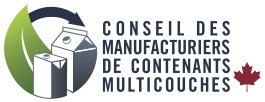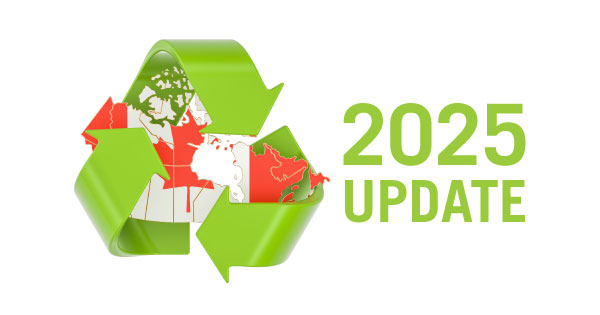From the Yukon to Prince Edward Island, full extended producer responsibility (EPR) programs for the recovery and recycling of packaging and paper products (PPP), which include food and beverage cartons, continue to be deployed across Canada. To recover the full range of targeted materials, these programs sometimes combine residential and out-of-home (public spaces, and industrial, commercial and institutional locations, also known as ICI) collection with deposit-return systems (DRS). Given the great variety of arrangements and diverse states of implementation in each province and territory, it can be challenging to keep up. As we’ve been doing every year since 2022, we briefly share below recent and upcoming developments of significance from our perspective.
Ontario
- Ontario’s Blue Box program has entered its third and final year of transition to full EPR. At a recent industry event in Toronto, Catherine McCausland, Director of Operations for the Reverse Logistics Group, which is the day-to-day operator of Ontario’s new common collection system (CCS), indicated that the biggest onboarding of communities was to come on January 1, 2026. These are the many transitioned communities that had opted to continue providing collection services during the 3-year transition, under contract to Circular Materials as the administrator of Ontario’s common collection system. At that time, this responsibility will cease, and the management of those collection contracts will be turned over to the CCS. These communities will be added to those who will transition during 2025, which represent about 60,000 tonnes of packaging and paper products a year.
- A fourth producer responsibility organization (PRO) for PPP began offering services in Ontario’s competitive system. On December 27, 2024, EnvironFocus joined Circular Materials, Ryse Solutions and Landbell Canada (which used to be known until recently as H2 Compliance North America) as party to the Common Collection System Access Agreement.
- In December, the Resource Productivity and Recovery Authority (RPRA) initiated a phased consultation process to enable it to draft guidance on the measurement and reporting of recovery performance in the new Blue Box program by the PROs. RPRA is expected to release a draft for comment soon.
- Over the summer, the Ontario government officially dropped plans for a producer-led DRS for non-alcoholic beverages, which would likely have included cartons.
Québec
- The modernized curbside collection system launched as planned on January 1st of this year. Under the new framework, municipalities remain in charge of collection but become service providers to Québec’s PRO, Éco Entreprises Québec (ÉEQ). ÉEQ is directly responsible for all post-collection-related activities and now has agreements in place with 21 sorting centres in the province.
- A new state-of-the-art MRF started operating in Montréal-East on January 2 and was officially inaugurated on February 7. It is owned by Matrec (a division of GFL) and is under contract to ÉEQ. ÉEQ also issued an RFP for a new MRF to be built in the Estrie region by 2028.
- Phase 2 of the modernization of the province’s DRS launched on March 1st. It adds all plastic beverage bottles under 2 litres to the system. In November 2024, the government had announced the postponement of the addition of all glass bottles and beverage cartons by two years, to March 2027.
Alberta
- Alberta’s EPR regulation came into force on November 30, 2022. The regulation allows for more than one PRO to operate for any designated material. PROs must be not-for-profit and unaffiliated with recycling services or waste management services. To date, only one PRO, Circular Materials, has come forward to handle PPP.
- Circular Materials is taking a phased approach to implementation with Phase 1 launching April 1, 2025, and Phase 2 rolling out October 1, 2026. Phase 1 is for registered communities which had existing recycling collection services as of November 30, 2022, while Phase 2 is for registered communities which did not have existing recycling collection services on that date.
Saskatchewan
- The transition from the current Multi-Material Stewardship Western shared-responsibility program to the rebranded SK Recycles full EPR system is taking place in three phases which started December 1, 2024. The transition is anticipated to be complete by the end of 2027.
New Brunswick
- Circular Materials Atlantic’s (CMA) stewardship plan for packaging and paper is being deployed in a phased approach. Implementation of single-family home collection in the final six regional service commissions took place between May and November 2024. Roll-out of services to unserved schools and multi-family buildings will be completed in 2025, and to public spaces, in 2027.
- In June 2024, CMA released an RFP for post-collection services in New Brunswick and Nova Scotia. This process is expected to lead to the establishment of a modern MRF infrastructure in the region over the next few years.
Nova Scotia
- Nova Scotia’s new EPR for Packaging, Paper Products and Packaging-like Products Regulations were enacted on August 2, 2023. The regulations come into force December 1, 2025, with Circular Materials Atlantic (CMA) as the approved PRO.
- CMA consulted on its required “Producer Readiness Report” from March to September 2024 and submitted the report to Divert NS on October 1, 2024.
Prince Edward Island
- Legislation has been introduced to move the DRS towards an EPR framework. At this time, the implementation timeline is unknown.
Yukon
- New EPR regulations for packaging and paper products in the Yukon went into effect on January 25, 2024. Circular Materials, the designated PRO, released a draft Stewardship Plan for Packaging, Paper and Single-Use Products in May 2024. On February 1, 2025, the Government of Yukon approved the plan and confirmed a program start date of November 1, 2025.
Others
Manitoba
The province intends to transition from the current shared-responsibility program to full EPR. Multi-Material Stewardship Manitoba (MMSM), which is the designated PRO, continues to prepare for the shift to full EPR while the transition plan submitted in 2022 is further reviewed.
Newfoundland and Labrador
The province is considering the implementation of full EPR for packaging and paper and held consultation sessions in 2022 with interested parties.
Northwest Territories
To date, the Northwest Territories have not proposed the introduction of EPR for paper and packaging.


